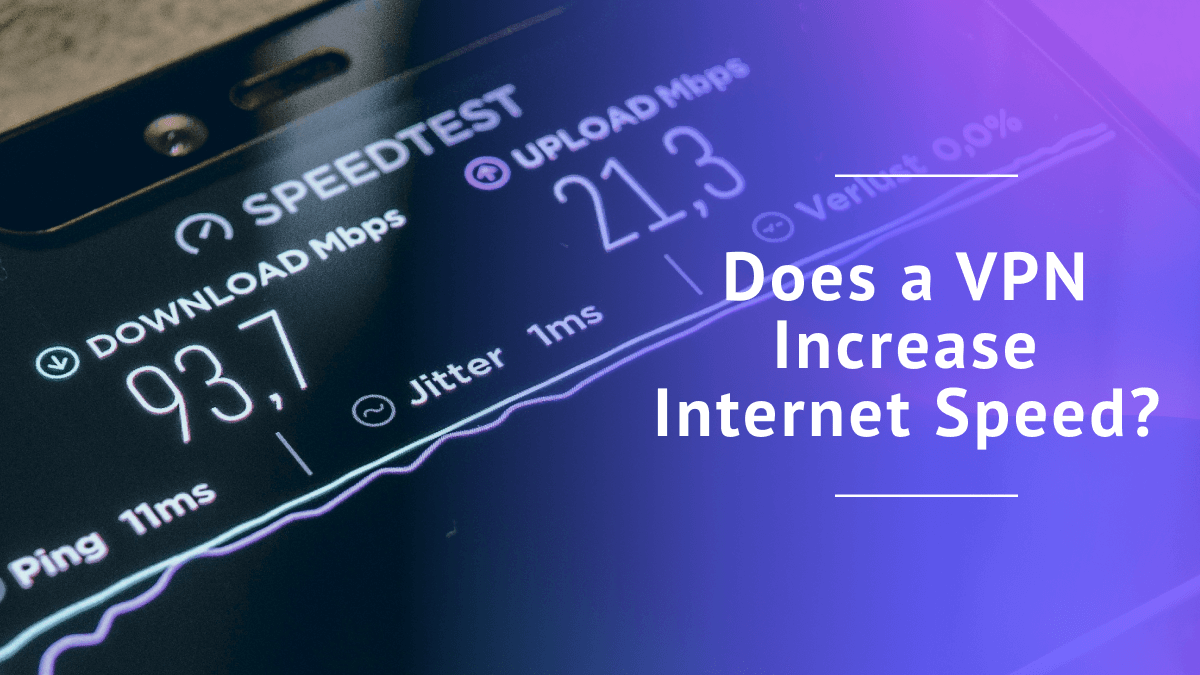
Does a VPN Increase Internet Speed? What You Need to Know in 2025
Quick Summary: Does a VPN Increase Internet Speed?
A VPN will reduce your internet speeds, which is a natural consequence of encryption and the distance between VPN servers — the greater the distance, the slower the connection. You can improve your VPN speeds by changing protocols, switching servers or getting faster internet.
Opt for NordVPN’s two-year subscription to enjoy considerable savings plus three complimentary months.
Does a VPN increase internet speed? Not really. Even the best VPNs will slightly reduce your internet speeds, but the change is usually negligible. Speed reductions depend on the distance between your physical location and the server you’re using, the server load and the encryption quality.
Sometimes, you may get faster speeds with a VPN if the provider’s routing is simpler or less clogged than that of your internet service provider (ISP). The amount of speed lost depends on your distance from the chosen server, your unprotected internet speeds and the type of VPN protocol you’re using.
This article explores how a VPN connection affects your overall internet speeds, what factors impact these speed changes and how you can improve your speeds. If you intend to use a VPN for streaming or gaming and need to know more, this article is for you.
Does a VPN Slow Down Internet Speed or Make It Faster?
A VPN is more likely to slow down your internet than increase it. When you connect to a VPN server, extra steps are added to your regular connection process. All your traffic is first routed through the server and must move a greater distance than usual. That could lead to some delays.
Additionally, a VPN service requires bandwidth to encrypt your DNS requests, and certain encryption protocols need more bandwidth. For instance, OpenVPN uses more bandwidth than WireGuard or IKEv2. I’ll discuss this in more detail in the next section.
What Affects Speed Performance When Using a VPN?
My unprotected internet speeds are capped at around 40 Mbps. The best speed I’ve ever gotten when using a VPN is 36 Mbps — a 10% speed drop. That may not be much, but it’s proof that your internet speeds are hit when you use a VPN. Here are the factors that affect your connection speed performance.
VPN Server Location
The distance your internet traffic covers when routed through a VPN server is crucial. In general, the further away the server is from your physical location, the slower the connection will be and vice versa. You’ll see the biggest impact on latency, as each ping must travel a longer distance between servers.
To counter this, some VPNs — like Surfshark and NordVPN — let you connect to the fastest server around, which usually happens to be the one closest to your location. However, when picking locations based on prior speeds, make sure the server really is where it claims to be and isn’t a virtual server.
This is why using a VPN provider with a high server count and distribution is important. You’re more likely to find a server closer to you with a VPN like CyberGhost, which has over 11,000 servers, than you would with Mullvad, which has over 600 servers.
Encryption Strength & Protocols
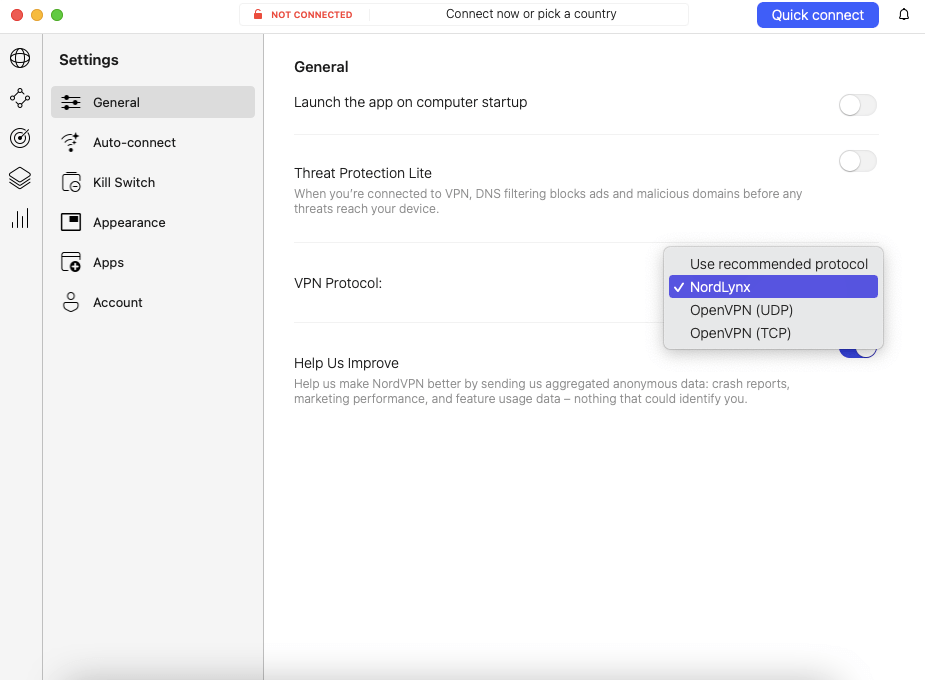
Encryption is the backbone of virtual private networks. The Advanced Encryption Standard (AES) is currently the most common algorithm used. It comes in three different levels: AES 128-bit, AES 192-bit and AES 256-bit.
The higher the encryption level, the more reliable the security. But the trade-off is that the larger bit sizes on AES-256 demand more bandwidth than AES 128-bit. Some top VPNs have found a way around this by using VPN protocols that don’t rely on encryption types like AES-256.
Protocols like WireGuard use the ChaCha20 stream cipher, which requires less processing power to encrypt the same amount of data. Other examples of these protocols include NordLynx by NordVPN and Lightway UDP by ExpressVPN.
If you’re using mobile data and want to reduce data consumption, I recommend switching to IKEv2. It uses fewer security associations to establish secure tunnels, so it needs fewer data packets to connect you to a server. This also makes it great at picking up new networks when it moves across boundaries.
VPN Server Load
Some VPN server locations are more popular than others. When too many people connect to these servers, connection speeds will be slower. For instance, you’re more likely to encounter high server loads on a U.S. server than on a UAE server since U.S. servers let you access popular streaming platforms you can’t find anywhere else.
VPN server congestion is often why free VPNs run slower; they limit the number of servers you can access. For example, hide.me only gives you eight free locations that all free account holders must share, leading to slow VPN connection speeds for everyone.
Overall Internet Speeds
Just like how a poker player makes do with the hand they’re dealt, a VPN can only make the most of the unprotected internet speeds it’s given. When you use a sluggish connection to connect to a VPN server, the best-case scenario is getting internet speeds that are equal to what your ISP provides.
However, even with the fastest VPNs, your speeds may be slower. The best solution to this is getting a faster internet package.
Can a VPN Improve Internet Speed?
A VPN can improve your internet speed under specific circumstances, but it’s rare. The common belief that VPNs can subvert ISP throttling is inaccurate — ISPs throttle speeds based on the activity they see, not the identity of the user behind it.
Gaming & Streaming: Can a VPN Help With Buffering?
A fast VPN can help with buffering in very limited situations. Every now and then, I connect to a VPN and find that my overall latencies and download speeds have improved. This is usually because the VPN’s private DNS is resolving faster than my ISP’s, or because the VPN is sending me on a shorter server route than the ISP would by itself.
However, if the cause of your buffering is congested VPN servers, slow unprotected internet speeds, or the limitations of the streaming service or gaming servers, there’s not much a VPN can do for you.
Do Free VPNs Slow Down Your Internet?
Free VPNs generally slow your internet more than premium ones for several reasons. Firstly, they offer a limited number of servers, which leads to server congestion as people flock to the service. This reduces overall speeds.
Secondly, some free VPNs have intrusive ads and poor encryption protocols that waste your bandwidth, further slowing down your internet. At the same time, there are some reliable free VPNs — like Proton VPN, which comes with servers in five locations and no monthly data caps. It’s high on our list of picks for the best free VPN for Netflix.
How to Speed Up a VPN Connection
The good news about VPNs is that they’re flexible. With a few configurations and server changes, you can speed up a VPN connection, letting you enjoy gaming and streaming without lags or buffering. Here are some tips to achieve this.
Get Faster Internet
Like I said earlier, VPNs work with what they’re given. If you struggle with slow speeds anytime you use a VPN, it’s time to upgrade to a faster internet package. For example, you need about 25 Mbps to stream 4K content comfortably. If you’re on 5 Mbps, a VPN won’t magically help you attain that. Slow internet will always be slow internet.
Change Protocols
Switching to a faster protocol is a reliable way to increase your VPN internet speeds. WireGuard and IKEv2 are usually faster than OpenVPN. At the same time, OpenVPN UDP is quicker than OpenVPN TCP. VPNs like ExpressVPN and NordVPN take things to the next level by offering proprietary protocols dedicated to improving speeds.
Adjust Your Encryption Level
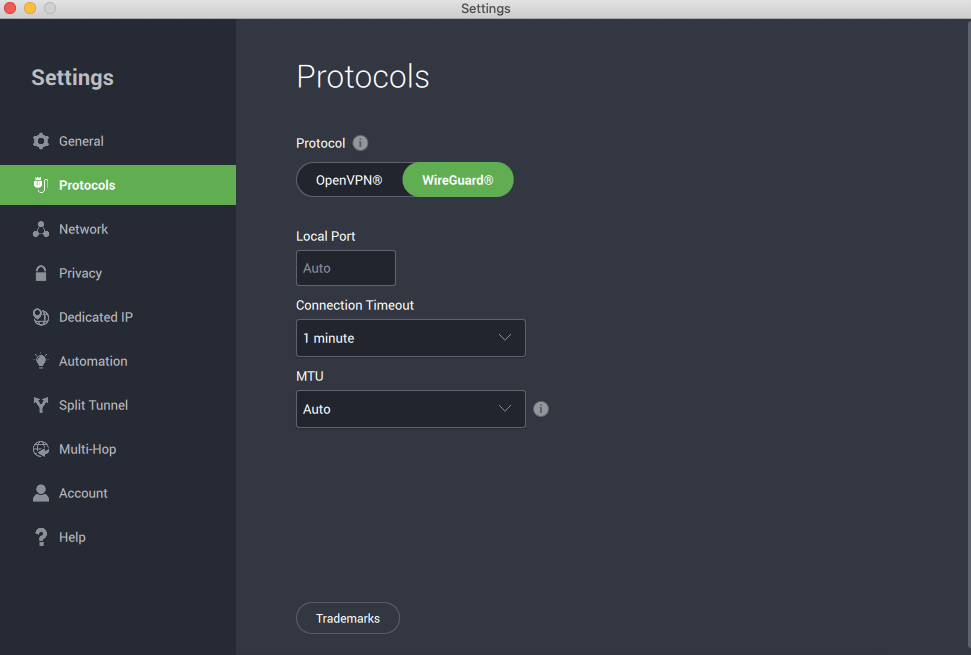
Although you’ll be reducing the degree of security that the VPN gives you, you may enjoy better speeds if you can switch your encryption level from AES-256 to AES-128. But let the record show that I don’t recommend this method. Furthermore, most VPNs don’t let you adjust the encryption level anyway. The only VPN that I know of with this option is Private Internet Access.
Switch Servers
Servers closer to your location will give you faster speeds, so consider connecting to one whenever you run into speed issues. Connecting to specialty servers like P2P or streaming-optimized servers could boost your speeds as they’re usually faster than regular servers.
In situations where you need a server from a specific location to unblock a restricted website, you can try switching to another server within the same country. Disconnecting and reconnecting the VPN can also improve things sometimes.
However, avoid using double VPN or obfuscated servers as they employ extra layers of encryption, further slowing down your speeds.
Disable Firewalls
Too many cooks in the kitchen never ends well. In the same way, having multiple security tools like VPNs and firewalls working concurrently will reduce your speeds. Firewalls can interfere with the smooth operation of important VPN ports, slowing down your connections. Therefore, deactivate your firewall if you can do without it.
Avoid Free VPNs
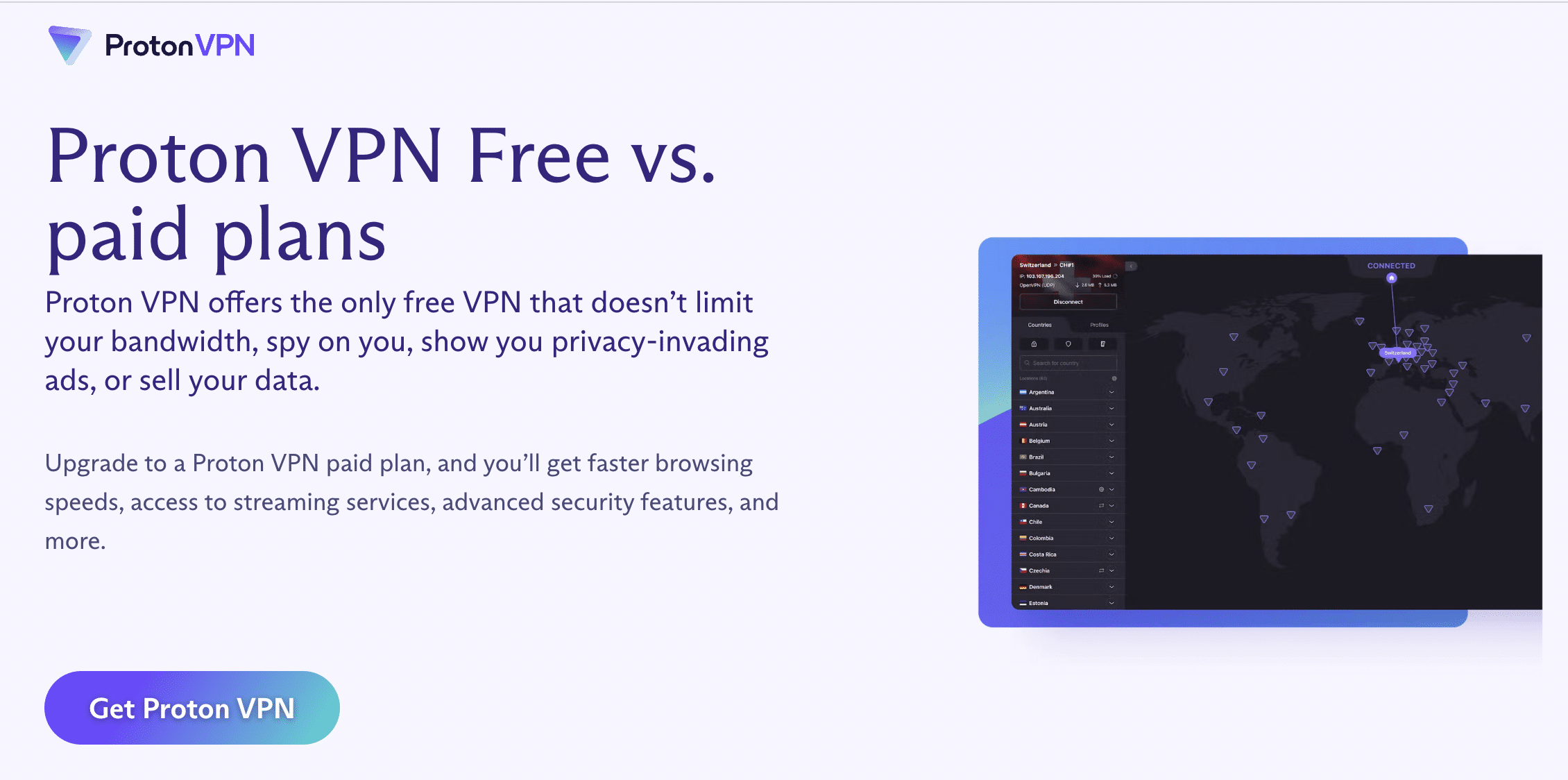
Many free VPNs aren’t fast as too many people use them, leading to congestion in the few servers available. I know the thought of a free VPN is irresistible, but take your time to filter through multiple options — our best free VPN list can get you started. Even better, find an affordable premium alternative like Surfshark with the features you need to get better speeds.
What Are the Fastest VPNs?
Some VPNs are quicker than others because they constantly improve their servers and provide special protocols that focus on speeds.
NordVPN is the fastest VPN I’ve ever tested and used. It offers amazing speeds when you use the NordLynx protocol, and it’s equipped with specialty P2P servers dedicated to torrenting — more on that in our NordVPN review.
ExpressVPN is another reliably fast VPN that features a unique Lightway protocol.It can handle buffer-free streaming, heavy gaming and quick downloads without issues. All the servers are optimized for speed; you can read more about them in our ExpressVPN review.
Surfshark has been upgrading its servers with 10 Gbps ports,so you can always rely on fast speeds, especially when you use the WireGuard protocol. It’s also one of the few VPNs with fast multi-hop servers, giving you double the security without affecting your overall speeds. Read this Surfshark review for more information.
How to Do an Internet Speed Test
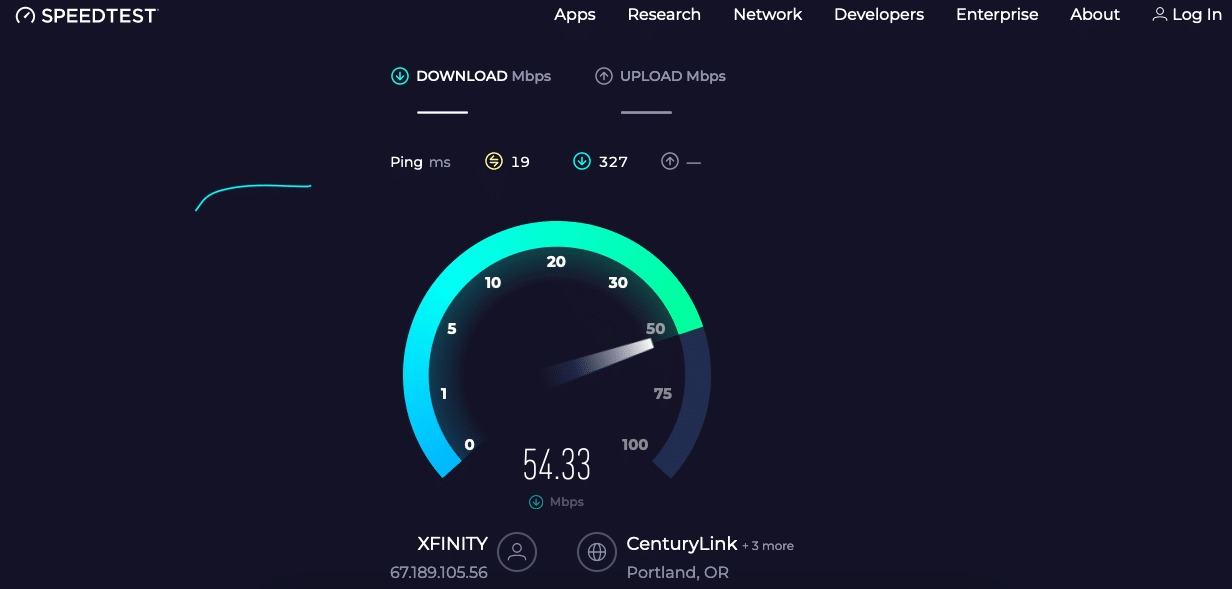
You can conduct VPN speed tests using the following quick instructions.
- Subscribe to a VPN
- Purchase a VPN subscription that fits your budget.
- Download and Install the VPN
- Based on the device you’re using, download the VPN from the official website or mobile app store.
- Launch the VPN and Connect to a Server
- Connect to a server of your choice. Use the fastest server that the VPN provides or choose the one closest to your physical location.
- Open a Speedtest Page
- There are many online speed test resources, and Speedtest by Ookla is one of the best. Open the web page, then tap “go” to run the speed test. The result will display the download speeds, upload speeds and the ping.
Conclusion
A VPN will likely reduce your internet speeds due to encryption. Other factors like the server distance, server load and protocol type can also affect your overall speeds. It’s all about tweaking the right settings to get that sweet spot.
Test NordVPN’s capabilities with a month-long return option, and secure long-term plans at reduced prices. ExpressVPN and Surfshark are also some of the fastest VPNs that can help bypass speed throttling. I don’t recommend using a free VPN, as server limitations and overcrowding make them slow.
If you’ve used a VPN for streaming and gaming before, what was your average speed drop? Did you make any changes to improve the speeds? Tell us more in the comments section below, and continue reading our blog for more insights.
FAQ: Does VPN Increase Internet Speed?
Does a VPN Make Your Internet Connection Faster?
A VPN is unlikely to make your connection faster, even in the case of ISP bandwidth throttling. However, on some occasions, a virtual private network can route your traffic more efficiently than your ISP can.How to Increase Internet Speed?
You can increase internet speed by using faster ISPs, installing a wired connection, switching to faster VPN protocols and servers, or adjusting encryption levels where possible.Does a VPN Increase Ping?
You should expect increased ping when using a VPN, although that increase is negligible in most cases.Does a VPN Improve Streaming?
A VPN can improve streaming if you’re experiencing speed throttling by your ISP. A VPN bypasses the imposed speed throttling and restores your speeds to the default, which is better for streaming.

Leave a Reply